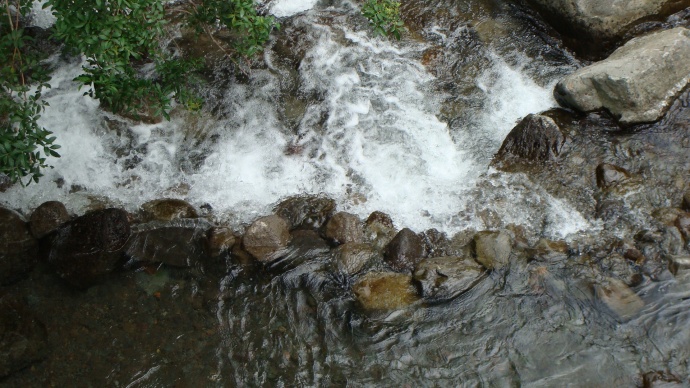Water Commission Drops Proposed Fine Against Maui Taro Farmer

ʻĪao Valley. Maui Now, Wailuku River file photo.
The state Commission on Water Resource Management on Tuesday voted not to impose fines against a family in ʻĪao Valley for their use of water from the Wailuku River to grow taro.
The Commissioners also decided to issue John and Rose Marie Duey the permit they have sought since 2004, and directed staff to develop an expedited permitting process for small farmers, according to information released by the Sierra Club of Hawaiʻi.
Testimony Seeks Rejection of Fines:
The decision came after more than three hours of oral testimony and an estimated 500 submissions of written testimony in support of the Duey ʻohana, expressing concern over a $4,500 fine that was proposed for alleged violations involving an incomplete permit.
The Sierra Club says the testimony expressed “outrage that the staff would propose such a hefty fine on a traditional taro farm while not pursuing enforcement actions against major companies,” which, the organization said, “have long diverted public water for private profit without proper permits.”
The testimony also noted the family’s years of volunteer leadership to restore the streams of Nā Wai ʻEhā on Maui. Office of Hawaiian Affairs Trustee Carmen Hulu Lindsey was among those who submitted testimony on the family’s behalf calling the proposed fine “unfair and an act of retaliation because of their faithful leadership in the Nā Wai ʻEhā case.”
“At face value, it appears that this motion would be targeting the Duey ʻohana for their efforts in Nā Wai ʻEhā, and more specifically, our Native Hawaiian practitioners and beneficiaries,” Lindsey wrote.
“Many people have suggested that my family is being punished for advocating that this commission uphold the law,” said Duey during testimony on Oʻahu. “For the record,” she said, “I would like to note that as a kanaka maoli, I question the state’s jurisdiction over this process, but I am here to protect my ʻohana’s Native Hawaiian rights to continue to grow kalo.”
She explained that her family has lived at ʻĪao since 1969, and she holds ancestral ties to the area from her father’s mother who was born in and also lived in the valley.
During testimony, Duey said that after 15 years of permit applications, correspondence and staff changes, she was “baffled, frustrated and angry” at the fine recommendation. “This represents the absolute worst of bureaucracy, turns the law on its head,” she said.
Events Leading Up to Fine Recommendation:
In 2001, the Duey’s purchased 18 acres from Wailuku Agribusiness through a quit claim deed, land that Duey said she believed “rightfully belonged” to the family. “There were at least 15 loʻi kalo on this land, and our extensive research, which we filed with this commission to supplement our water use permit application, establishes that land was in kalo at the time of the mahele and my ʻohana was farming it,” Duey said.
According to Duey, Wailuku Agribusiness gave the International Zen Dojo of Maui the property directly upstream of them. She said a bulldozer worked the land at the Zen property for several weeks and “thoroughly destroyed the portion of the ancient ʻauwai on Zen’s property, cutting off the water for the entire system. I would like to know, where was the commission on that.”
“Mr. David Higa who used to be in charge of stream channel alteration permits for this commission became aware that the ʻauwai to our loʻi kalo was destroyed, and gave us permission by phone to place a pipe in the river for our loʻi. As a Native Hawaiian, this is my traditional and customary right,” she said.
In the phone conversation, Duey testified that, “Mr. Higa said if you are Hawaiian, farming kuleana lands that have prior use of water, you do not need a permit. I too truly believe that statement. After all,” she said, “it’s in the water code.”
The pipe, which is located in the river that crosses the Duey property, carries an estimated 26,000 gallons of water per day to the ʻauwai and taro patches, with an estimated 95% being returned back to the river, according to testimony.
‘I would not be here if the ancient ʻauwai system had been protected and water flowed through the manawai and kuleana lands as it should,” according to Duey’s testimony. “I have rights to grow kalo and feed my family,” she testified.
Decision Rendered, Expedited Permitting Sought for Traditional Practices
Marti Townsend Director for the Sierra Club of Hawaiʻi issued a statement saying, “The members of the Water Commission should be applauded for immediately recognizing that the staff proposal to penalize these taro farmers was tone deaf and out of step with the Commission’s mission.”
“Today’s decision at the Water Commission was a victory for our streams and our unique way of life here,” said Townsend. “This decision was made possible by quality appointments to the Water Commission. In particular, Commissioners Mike Buck, Neal Hannahs, and Kamana Beamer should be recognized for their leadership on this important decision.”
The Commission decided to overhaul the staff recommendation by removing all references to fines, penalties, and violations. The Commission then issued the permit that the Duey ʻOhana had applied for in 2004, including the full amount of water they requested, subject to final resolution in the ongoing Nā Wai ʻEhā water allocation case, according to the Sierra Club.
The Commissioners also specifically directed staff to develop a process of expedited permitting for traditional and customary Native Hawaiian water uses.










